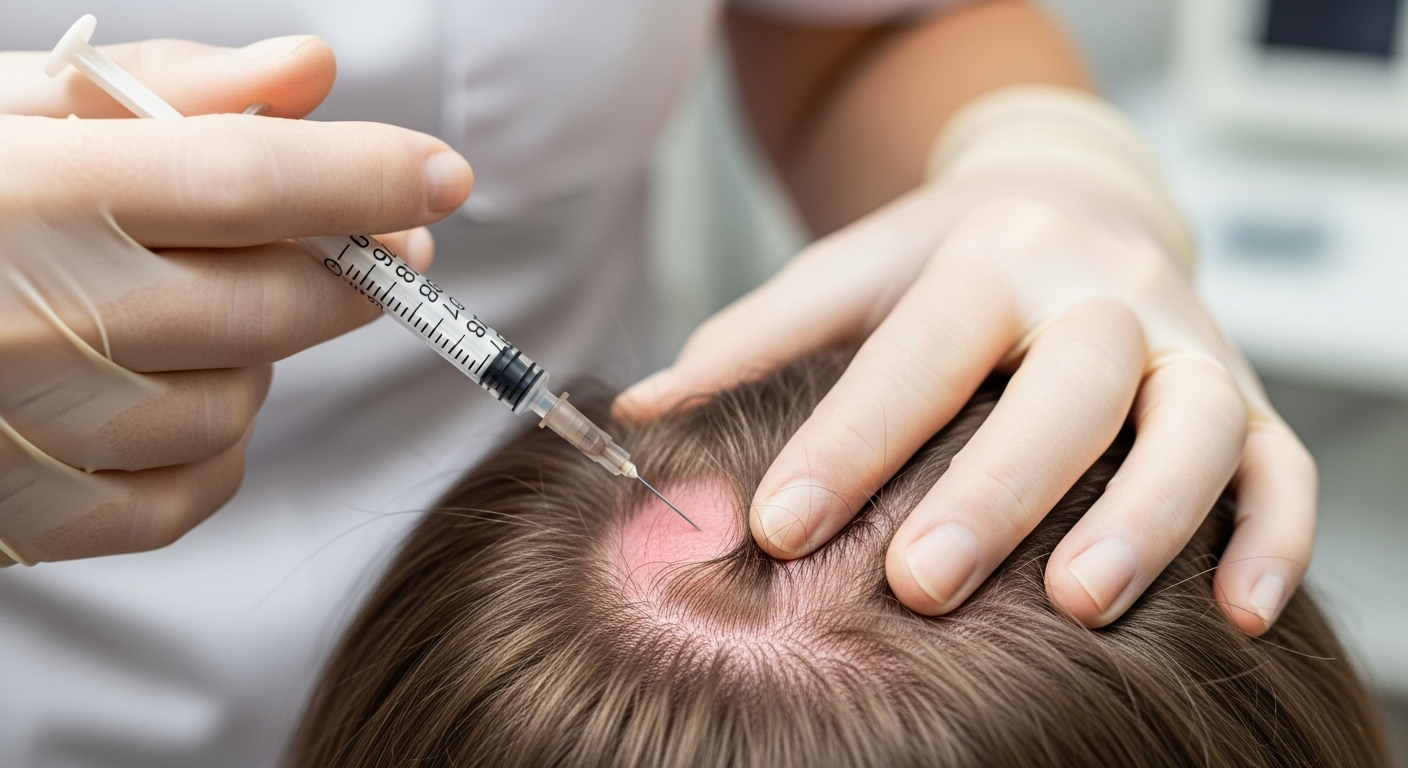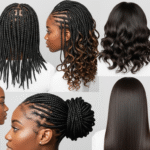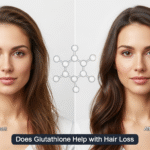Hair loss can be a stressful and frustrating experience, and finding the right treatment is crucial for regaining confidence. One promising solution is hair steroid injections for hair loss, which have been shown to promote hair regrowth in people suffering from certain types of hair loss, including alopecia areata. This article explores the effectiveness, benefits, …
Hair loss can be a stressful and frustrating experience, and finding the right treatment is crucial for regaining confidence. One promising solution is hair steroid injections for hair loss, which have been shown to promote hair regrowth in people suffering from certain types of hair loss, including alopecia areata.
This article explores the effectiveness, benefits, risks, and the procedure itself. By the end, you’ll have a clear understanding of how this treatment works and whether it’s right for you.
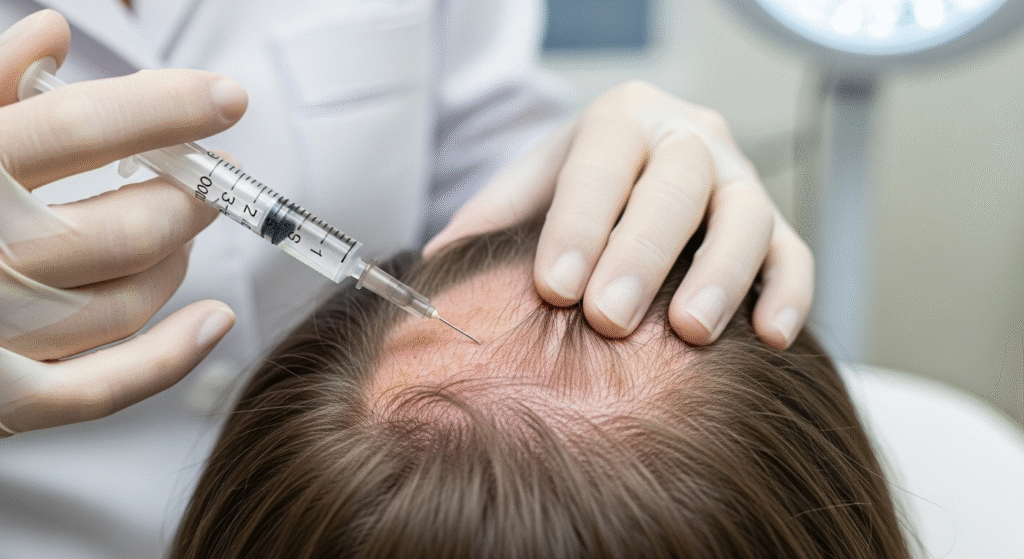
What Are Hair Steroid Injections for Hair Loss?
Definition and Mechanism of Action
Hair steroid injections, primarily corticosteroids, are a common treatment used to address hair loss conditions such as alopecia areata, a condition where the immune system attacks hair follicles.
These injections work by reducing inflammation around the hair follicles, thereby encouraging hair regrowth. Corticosteroids are synthetic drugs that mimic the action of hormones naturally produced by the adrenal glands, helping to suppress immune system activity and promote hair growth in affected areas.
The injections are typically administered directly into the scalp at the site of hair thinning or bald patches. Over time, the steroid helps stimulate the hair follicles, promoting new hair growth and improving the health of existing hair.
Common Conditions Treated with Steroid Injections
- Alopecia Areata: This autoimmune disorder causes hair to fall out in small, round patches.
- Scarring Alopecia: This type of hair loss occurs when the hair follicles are damaged due to inflammation and scarring.
- Other Hair Loss Conditions: Steroid injections may also be used to treat some cases of male and female pattern baldness, although they are not as effective in these situations.
Benefits of Hair Steroid Injections for Hair Loss
Effective Treatment for Alopecia Areata
Hair steroid injections have been shown to be highly effective in treating alopecia areata. According to a study published by the American Academy of Dermatology, up to 80% of patients with alopecia areata experience hair regrowth following corticosteroid treatment. The injections help reduce inflammation and stimulate hair follicles, which can lead to a significant improvement in hair density and regrowth.
Minimally Invasive and Quick Procedure
Unlike surgical hair restoration methods, such as hair transplants, hair steroid injections are a non-invasive treatment that can be completed in a short amount of time. The procedure typically takes less than 30 minutes and doesn’t require anesthesia. It’s also a relatively affordable option compared to other hair restoration treatments.
Promotes Hair Regrowth and Thickness
Steroid injections not only help with the regrowth of new hair but also improve the thickness of existing hair. By stimulating dormant hair follicles, the treatment encourages stronger, fuller hair growth. For people with patchy hair loss, steroid injections can fill in gaps and provide a more uniform hairline.
The Procedure: What to Expect During Hair Steroid Injections
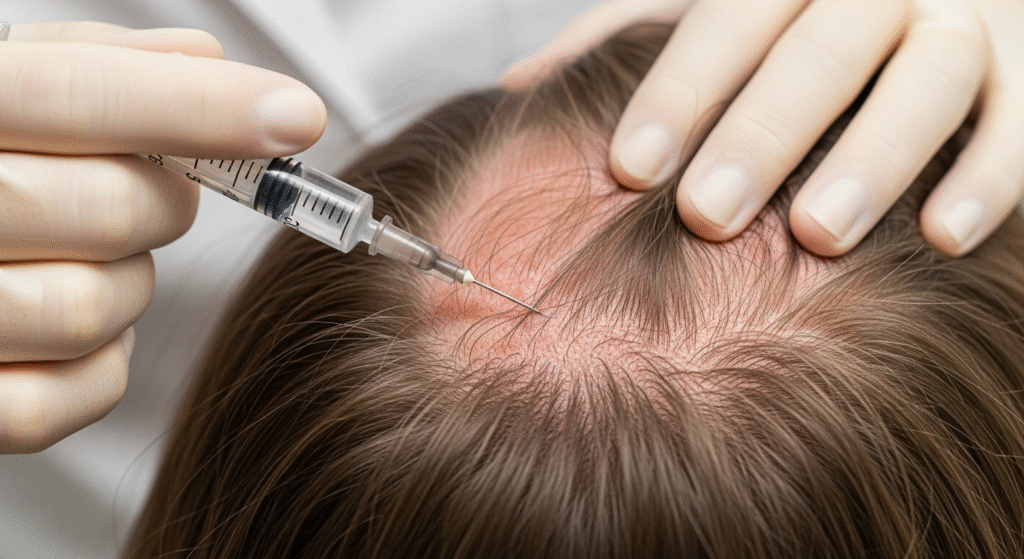
Pre-Treatment Consultation
Before administering the steroid injections, a consultation with a dermatologist or a hair restoration specialist is necessary. During this appointment, the specialist will assess your condition, review your medical history, and determine if you’re a suitable candidate for the procedure. They may also discuss other hair loss treatment options, depending on the severity and type of your hair loss.
The Injection Process
The procedure involves injecting corticosteroids directly into the scalp in areas where hair loss has occurred. The injections are typically spaced out over several sessions, with each session targeting specific areas of the scalp. The injections are relatively painless, although some individuals may experience mild discomfort or a pinching sensation. To minimize pain, some specialists may apply a numbing cream before the procedure.
Post-Treatment Care and Recovery
After the injections, patients may experience minor swelling, redness, or tenderness at the injection sites. These symptoms typically resolve within a few hours to a few days. It’s essential to follow post-treatment care instructions, such as avoiding vigorous scratching or massaging of the scalp, to allow the steroid to work effectively.
Patients can usually return to normal activities immediately after the procedure, but some may be advised to avoid certain scalp treatments for a short period.
Risks and Side Effects of Hair Steroid Injections
Common Side Effects
While steroid injections are generally safe, some patients may experience temporary side effects. These include:
- Redness or irritation at the injection site
- Minor pain or discomfort
- Skin thinning in the treated area (though this is rare)
Long-Term Risks
With prolonged use of steroid injections, there may be some long-term risks. These can include:
- Hair Thinning: In rare cases, the surrounding hair may thin out due to the steroid’s impact on the hair growth cycle.
- Skin Changes: Prolonged steroid use can sometimes lead to changes in the skin, such as thinning or changes in pigmentation.
Who Should Avoid Steroid Injections?
Steroid injections may not be suitable for individuals with certain health conditions, including:
- Uncontrolled Diabetes: Since steroids can affect blood sugar levels, individuals with diabetes should avoid these injections unless approved by a doctor.
- Autoimmune Disorders: Those with active autoimmune diseases should consult their doctor, as steroids can sometimes exacerbate symptoms.
- Pregnancy: Steroid injections are generally not recommended during pregnancy, so it’s important to consult a healthcare provider before seeking treatment.
How Effective Are Hair Steroid Injections for Hair Loss?
Success Rates for Different Types of Hair Loss
Hair steroid injections are most effective for treating conditions like alopecia areata, with success rates as high as 80%. However, the results for other types of hair loss, such as androgenetic alopecia (male pattern baldness), may be less pronounced. The effectiveness of the injections depends largely on the cause and extent of the hair loss.
Comparing Steroid Injections to Other Hair Loss Treatments
When compared to topical treatments like minoxidil or oral medications like finasteride, steroid injections often offer faster and more visible results for patients with autoimmune-related hair loss. However, for male pattern baldness, hair transplants or oral medications may be more effective in the long run.
How Long Do Results Last?
The results from steroid injections typically begin to show within 4-6 weeks after the first session, with full effects visible after 2-3 months. Regular follow-up treatments may be necessary to maintain results, with some patients requiring injections every few months.
FAQs
Are Hair Steroid Injections Safe?
Yes, hair steroid injections are generally considered safe when administered by a qualified professional. However, there are some risks, such as skin thinning or redness at the injection site. It’s important to consult with a healthcare provider before starting treatment to ensure it’s the right option for you.
How Many Injections Are Needed for Hair Regrowth?
Most patients require 3-4 injection sessions spaced out over several weeks or months. Your doctor will determine the appropriate frequency based on your hair loss severity and response to treatment.
Can Steroid Injections Work for Male Pattern Baldness?
Steroid injections are generally not effective for treating male pattern baldness. This type of hair loss is often better treated with oral medications like finasteride or hair transplant surgery.
Conclusion
If you’re struggling with hair loss and are considering hair steroid injections, it’s important to consult with a dermatologist or hair restoration specialist to determine if this treatment is right for you. With the right care and treatment plan, you can achieve noticeable improvements in hair regrowth and thickness.
Book a consultation with Dr. Uzma Irfan, an ISHRS-certified surgeon in Islamabad today to discuss hair steroid injections for hair loss and learn how this treatment can help you achieve the hair you’ve always wanted.

